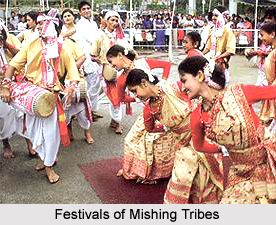 The Mishing Tribes mainly concentrated in the districts of Assam celebrate festivals associated with cultivation. The two important festivals celebrated by them are Ali-a:ye L¡gang and Porag. During the celebration, they organise hunting expeditions and arrange grand feasts. Apart from these there are several dances and festivals of the Mishing tribe. Their dances are called Paksong or Soman and it bear great similarity with the Bihu dance of Assam. Their songs also known as Niton are chiefly of three major types and these are Aku, Oi and Anu Nitone. Aku depict the history and rich culture of the people whereas Oi and Anu Nitone are contemporary love songs and use modern musical instruments. Drum, clapping metal bells and bansuri are the local instruments used by Mishing tribe. The important festivals of the Mishings have been discussed below:
The Mishing Tribes mainly concentrated in the districts of Assam celebrate festivals associated with cultivation. The two important festivals celebrated by them are Ali-a:ye L¡gang and Porag. During the celebration, they organise hunting expeditions and arrange grand feasts. Apart from these there are several dances and festivals of the Mishing tribe. Their dances are called Paksong or Soman and it bear great similarity with the Bihu dance of Assam. Their songs also known as Niton are chiefly of three major types and these are Aku, Oi and Anu Nitone. Aku depict the history and rich culture of the people whereas Oi and Anu Nitone are contemporary love songs and use modern musical instruments. Drum, clapping metal bells and bansuri are the local instruments used by Mishing tribe. The important festivals of the Mishings have been discussed below:
Ali-a:ye L¡gang
Ali-a:ye L¡gang is celebrated at the beginning of the agricultural production. The word Ali means `yam` and a:ye means `fruit` or `grain.` L¡gang denotes `beginning of sowing`. The festival begins with the head of the family sowing a small amount of paddy seeds. It is the ploughed with a hoe. The Mishings recite prayers for the guardian spirits as well as the ancestors. During the celebrations the feasting part includes the Purang apin, a special type of sticky rice packed in a leaf and rice beer. In the evening, young men perform dances and sing songs known as gumrag so:man in the front yard of the houses. Bell-metal gong, known as le:nong or marbang are played along with drums and cymbals at the time of singing and dancing. The drums are played according to a particular rhythm of gumrag so:man only. Ali-a:ye L¡gang is celebrated for five days. On the last day of the festival ends with feasting at homes.
Po:rag
The Po:rag festival is celebrated after a good harvest. The festival is marked by grand feasting and merry making. A lengthy preparation is required for the celebration of the festival hence it is celebrated once in two or three years. The festival starts with prayers under the guidance of a Mibu, a medicine man. When the Mibu is absent the festival is conducted under the leadership of an aged person of the village. All the members of the village are given a lavish treat. Pork is compulsory item on the menu. Apart from this po:ro apong, a rice beer of black colour made through fermentation of a mixture of burnt chaff and half cooked rice. It is a unique drink of the Mishings. The couples usually bring few youths for dancing and singing. Local dignitaries as well as eminent people from the neighbouring villages are also invited for the occassion. The festival is celebrated for three days and is accompanied by singing, dancing, feasting and merry making.
Dobur
Dobur is an animistic ritual celebrated occasionally by the Mishing Tribes. There are four types of Dobur, Mo:pun Dobur, Burte Dobur and Raban Ko:son organised by the Mishings. Burte Dobur is the most common them. It is usually practised when a member of the village commits a sin against a benevolent or malevolent spirit. The villagers believe that it might cause harm and suffering to their village hence the sinner is made to pay in cash or kind. The boys then go around the village and stroke the walls of every house with sticks to drive out the evil spirits. People who participate in this ritual assemble in a particular spot away from the village. There they sacrifice sows and hens to the spirits to appease them. Later they together have a feast. The place where the sacrifice has been done is regarded as a protected area on that particular day. Mo:pun Dobur and Raban Ko:son are observed to appease the spirits so that their crops, hens and sows remain protected. The hunters practise the Ko:son Dobur to appease jungle spirits. It is believed that it helps them in their hunting process and protects them against any harm. Hens are sacrificed during this occasion.
















